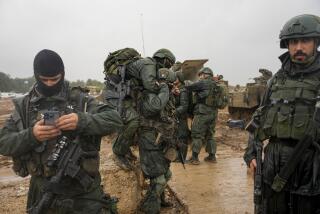U.S. General Says Iraqi Rebels Getting Stronger
- Share via
BAGHDAD — In a week that has already seen five more U.S. combat deaths and the wounding of 41 soldiers, the commander of military forces in Iraq indicated Thursday that resistance to the occupying troops was strengthening and warned Americans to brace for more casualties.
With 313 American soldiers dead in the conflict so far, more than half since President Bush declared major combat over May 1, Army Lt. Gen. Ricardo Sanchez told reporters at a weekly news briefing here, “This is still wartime.”
“There is still some intense fighting to be done, especially out in the west,” he said. “We should not be surprised if one of these mornings we wake up and ... there has been a major firefight with some casualties or a significant terrorist attack that kills significant numbers of people.”
Sanchez said the U.S.-led forces are engaging resistance groups 15 to 20 times a day, on average, with as many as 25 incidents on some days. Military spokesmen have cited lower figures in the past.
The general added that the resistance was showing signs of improved organization. Though most attacks against U.S. forces are being carried out by small, locally based groups apparently acting on their own, there are indications that the resistance is beginning to operate under a broader, more regional control, Sanchez said.
A string of incidents Thursday, including gunfire and a land mine explosion in and near the troubled city of Fallouja, about 35 miles west of Baghdad, served as a reminder that resistance remained strong.
A spokesman at the U.S. military command headquarters in Baghdad said a vehicle in a convoy traveling west of Fallouja hit the mine. There were no American casualties, the spokesman said.
Hours earlier, U.S. forces in Fallouja exchanged small-arms fire with an Iraqi gunman outside the mayor’s office, but the same spokesman said he had no reports of casualties, although Reuters and Associated Press reported that one Iraqi was killed and four others wounded.
Three uniformed Americans were killed in attacks Wednesday.
Sanchez stressed that U.S. forces were improving their ability to confront the resistance, a statement echoed Thursday in Washington by Defense Secretary Donald H. Rumsfeld and Air Force Gen. Richard B. Myers, chairman of the Joint Chiefs of Staff, who defended American progress in Iraq.
“While there is no question we have faced some challenges and we’ve got some ahead of us, we have really achieved numerous successes and expect the situation to continue to improve,” Myers told reporters at a Pentagon news conference. “We’re in this for the long haul and ... we’ll get the job done.”
U.N. Wants a Lead Role
At the United Nations, Secretary-General Kofi Annan told a closed-door gathering of Security Council members that the world body must be given a leading role in shaping Iraq’s political transition or it would not be involved in the nation at all, according to several diplomats and U.N. officials who attended the meeting.
Annan has been seeking a major role for the U.N. in helping Iraq draft a constitution and hold elections.
His ultimatum could be another setback to U.S. efforts at the world body to obtain international help in stabilizing the country.
Except for a soldier killed on patrol in Baghdad, the encounters between U.S. forces and resistance fighters Wednesday and Thursday occurred in a part of Iraq along the Euphrates River north and west of the capital known as the Sunni Triangle, for the high concentration of Sunni Muslims living there. Sunnis have dominated the country politically for generations, even though Shiite Muslims make up nearly two-thirds of the population.
Deposed leader Saddam Hussein and many of his most loyal followers are believed to form the core of the resistance to the occupation.
On Thursday, Sanchez noted that more foreign fighters and terrorists had become involved in the attacks against Americans since organized resistance first became a major concern during the second half of May.
In remarks he made recently at the Brookings Institution in Washington, Iraq’s interim foreign minister, Hoshyar Zebari, said Islamic extremist groups Ansar al Islam, Al Qaeda and Takfir wal Hijra were actively opposing the occupation from inside Iraq.
Sanchez described what he termed “a base of foreign fighters that continues to flow in on ratlines from Syria and northern Iran.”
Although the war in Iraq was justified by the Bush administration in part as an important step in its declared war against international terrorism, critics say that the continued presence of foreign fighters in the country is evidence that the conflict has been a setback to the White House effort.
Administration officials have argued that the foreign militants were drawn to fight U.S. forces in Iraq for fear of losing a base from which to conduct terrorism.
Citing the improved organization of the resistance, Sanchez said: “The enemy has evolved.... He’s a little bit more lethal, a little more complex, a little bit more sophisticated and, in some cases, a little bit more tenacious.”
He noted that in a growing number of attacks, resistance fighters have used homemade bombs cobbled together from some of the more than 600,000 tons of Iraqi arms and munitions stored throughout the country. Sanchez said it was impossible to guard such a large amount of weaponry.
“We find new dumps every day,” he said.
Times staff writers Esther Schrader and Robin Wright in Washington and Maggie Farley at the United Nations contributed to this report.
More to Read
Sign up for Essential California
The most important California stories and recommendations in your inbox every morning.
You may occasionally receive promotional content from the Los Angeles Times.













